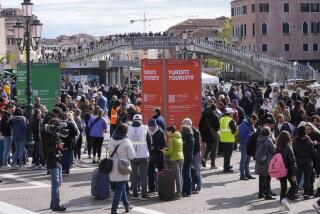New Laws in Venice Will Limit Tourists
The influx of tens of thousands of less-than-affluent day-trippers from Eastern Europe this summer has prompted city officials in Venice to institute new laws to cope with their tourist dilemma.
As part of a campaign to restore “order and decorum,” the city council has introduced fines for picnickers in St. Mark’s Square and erected barriers to prevent sitting on the steps of the cathedral.
Sitting on sidewalks, bathing tired feet in the canals, and sunbathing in the squares are all banned under the order, which includes the threat of jail terms of up to five years for serious offenders.
How bad was the problem? One Saturday morning in June, 1,200 buses arrived and spilled out 60,000 East European visitors--a number just short of Venice’s resident population.
Mayor Ugo Bergamo said the crackdown was not intended to penalize impoverished tourists from the East but to make all visitors “understand that Venice should be respected.”
He said the council is planning to improve its services to meet the needs of tourists with little to spend.
These plans include opening the city’s museums and palaces free of charge one day a week, trying to recruit volunteer tour guides, increasing the number of public restrooms and creating a picnic area in a park around the corner from St. Mark’s and the Doges Palace.
“Venice is a civilized city that wants to cope with this problem,” Bergamo said. “We would like to be a bridge between East and West, just as Venice was in the days of its sea-going empire.”
Quick Fact: The average Tokyo commuter spends 2 hours and 24 minutes each day aboard a train getting to and from the city.
Grains of Time: Studies on how to restore Cancun’s beach are about half complete, and work will probably begin in 1991. A large portion of the resort’s famous white-sand beach washed away when Hurricane Gilbert hit the Yucatan Peninsula two years ago.
Quintana Roo Gov. Miguel Borge Martin was recently quoted in the Mexican press as saying that everyone who benefits from the beach should cooperate to restore the seven-mile section of beach. His comment was an apparent call to resort hotel owners to foot the bill for the expensive work.
Because the movement of heavy equipment and construction workers will disrupt tourist activities, work on restoring the beach is unlikely to begin before next year, after the peak tourism season that begins in December.
To Moscow by Train: An increased demand for travel to the Soviet Union has prompted GermanRail to introduce direct weekly sleeping-car service between Cologne and Moscow.
The train, which features 10 sleeping cars, leaves Cologne each Sunday at 6:32 p.m. and, after several stops in Germany, arrives in the Soviet capital at 11:57 a.m. each Tuesday.
Shrinking Dollars: Americans traveling in Europe are finding the purchasing power of the already weak dollar sapped even further by the crisis in the Persian Gulf.
From London to Athens, the dollar buys far less than it did a year ago, having lost about 20% in value to benchmark European currencies since this time last year.
A slowdown in the U.S. economy, lower interest rates in Europe, greater interest in Euro-currencies and, now, higher oil prices resulting from Iraq’s takeover of Kuwait and the renewed threat of a U.S. recession, have pushed the dollar down, according to financial analysts.
The dollar is at a historic low against the deutsche mark, dropping from about 1.75 marks to 1.54 in just two months. In Britain, the pound is nearing the benchmark $2 level. In Italy, the dollar has plunged to its lowest level against the lire since 1981.
Many Boards, Little Boredom: What does it take to build the world’s tallest wooden roller coaster? Try 1.5 million board feet of treated Southern yellow pine. That’s how much wood that Cedar Point amusement park in Sandusky, Ohio, will be using to build the park’s 10th roller coaster next year.
The $7.5-million coaster will be 160 feet tall, will have a track 5,427 feet long, repeating a figure-eight pattern three times, and will have the longest drop of any wooden roller coaster ever built. Three 28-passenger carriages will provide rides to about 1,600 people per hour.
That works out, incidentally, to about three minutes per ride.
Quick Fact: How much does airline jet fuel cost per gallon? Before Iraq invaded Kuwait it was 64 cents a gallon. Now it’s 94 cents a gallon.
Rabbit Transit: One of the first glimpses Japanese children get of Western culture is, wait for it, Peter Rabbit. Beatrix Potter’s characters are immensely popular in Japan and will be the subject of a touring exhibition later this month.
Entitled “Beatrix Potter’s Lake District,” the exhibition of photographs, videos and models of the area will open Thursday in Tokyo, to be attended by Princess Anne, then will move on to Osaka, Okayama and Kyoto.
It is being sponsored by NHK, Japan’s national broadcasting company, which has made a $100,000 donation to the British National Trust’s Lake District Appeal.
pichar
Bulgarian Link: Greece and Bulgaria have established a nw train link between Thessaloniki and Sofia. The twice-a-week service is an overnight journey, and plans call for the route to be extended into the Soviet Union in the future.
Ferry Tale: Mediterranean passengers headed for the Greek island of Rhodes can take the new 8,000-ton ferry boat Rodos, which completes the trip from Piraeus to Rhodes in 12 hours. The vessel can accommodate 1,400 passengers and 120 automobiles.
Take Your Seats: According to the Airline Passenger Assn. of North America, airline seats are shrinking.
The average “seat pitch,” which governs legroom, has decreased on U.S. airlines from 34 to 31 inches. The minimum permitted by the Civil Aviation Authority is 26 inches.
More to Read
Sign up for The Wild
We’ll help you find the best places to hike, bike and run, as well as the perfect silent spots for meditation and yoga.
You may occasionally receive promotional content from the Los Angeles Times.






